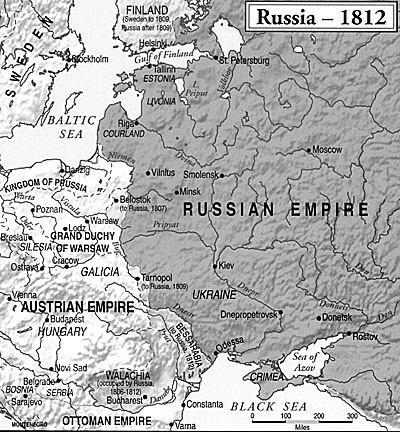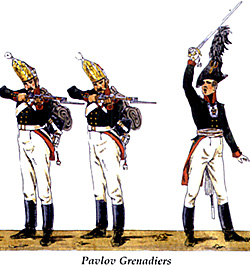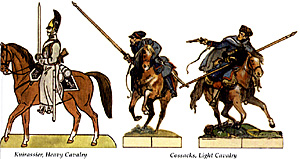 The French Revolutionary and Napoleonic Wars facilitated the emergence of Russia from a state at the fringes of Western civilization to one of Europe's acknowledged great powers. The Revolution found the formidable Catherine the Great, who ruled 1762-1796, accomplishing a long-standing Russian objective of Poland's suppression and partition (1793 and 1795), having ended two years of war with Sweden in 1790, and forced to conclude a five-year war with the Ottoman Empire in 1792 after Austria made a separate peace in 1791. Her son, "the mad Tsar," Paul I reversed many of her reforms and pushed Russia, partly because of Napoleon's 1798 invasion of Malta, into more active involvement against Revolutionary France.
The French Revolutionary and Napoleonic Wars facilitated the emergence of Russia from a state at the fringes of Western civilization to one of Europe's acknowledged great powers. The Revolution found the formidable Catherine the Great, who ruled 1762-1796, accomplishing a long-standing Russian objective of Poland's suppression and partition (1793 and 1795), having ended two years of war with Sweden in 1790, and forced to conclude a five-year war with the Ottoman Empire in 1792 after Austria made a separate peace in 1791. Her son, "the mad Tsar," Paul I reversed many of her reforms and pushed Russia, partly because of Napoleon's 1798 invasion of Malta, into more active involvement against Revolutionary France.
Russia's remarkable successes under Field Marshal Suvorov in Italy in 1799 were offset by poor performances in Flanders and Switzerland. The perception of inadequate support from Britain and Austria, Britain's conquest of Malta in 1800, and British naval belligerency (which induced Russia to form the Baltic League of Armed Neutrality) persuaded the erratic Tsar to consider siding with France -- a prospect that was cut short by Paul's assassination in 1801. It was under the young Tsar Alexander I that Russia's 37.5 million people made their contributions to the war against Napoleonic France.
Alexander's liberal tendencies were eventually overcome by his belief that Napoleonic domination of Europe was unacceptable, even calling the French Emperor the Antichrist at one point for Napoleon's favorable treatment of the Jews, among Bonaparte's other objectionable actions.
 Russia joined the Third and Fourth Coalitions against France in 1805 and 1806, while expansionist interests led Russia back to war with the Ottoman Empire during 1806-1812 and into a brief war in 1808-1809 to wrest Finland from Sweden.
Russia joined the Third and Fourth Coalitions against France in 1805 and 1806, while expansionist interests led Russia back to war with the Ottoman Empire during 1806-1812 and into a brief war in 1808-1809 to wrest Finland from Sweden.
Pushed back to its own borders by Napoleon's 1807 Polish campaign, Russia sued for peace. The famous meeting of the Russian and French emperors in the middle of the Niemen River at Tilsit led to an affiliation of sorts and to an apparent understanding between the two. However, Alexander was far less enthusiastic about the alliance than Napoleon, who sought to bring Russia into the Continental System against Britain. By 1812, the Tsar's open trading with Britain led to Napoleon's fateful invasion. To defend against Napoleon's massive 600,000 multinational force, Russia terminated its war with the Ottomans, freeing an army from that front and gaining the disputed region of Bessarabia.
With a reformed and reorganized army since 1807, the Russians characteristically fought hard in 1812, especially under their popular Field Marshal Kutusov, when finally forced into battle.
 But it was disease and the extremely harsh Russian winter that destroyed Napoleon's army, and Kutusov's pursuing force suffered almost as much as the French and their allies during the retreat back to Poland. Russia remained a tenacious opponent to the end, Tsar Alexander providing much of the manpower and zeal that pushed the Allied war effort throughout the successful campaigns of 1813-1814.
But it was disease and the extremely harsh Russian winter that destroyed Napoleon's army, and Kutusov's pursuing force suffered almost as much as the French and their allies during the retreat back to Poland. Russia remained a tenacious opponent to the end, Tsar Alexander providing much of the manpower and zeal that pushed the Allied war effort throughout the successful campaigns of 1813-1814.
More Powers of the Napoleonic Era
- France
Great Britain
Duke of Wellington Profile
Austria
Archduke Charles Profile
Russia
Field Marshal Kutusov Profile
Prussia
Field Marshal Blucher Profile
Spain
The Peninsula War
Ottoman Empire
Minor Powers
Back to Table of Contents -- Napoleon #17
Back to Napoleon List of Issues
Back to MagWeb Master Magazine List
© Copyright 2001 by Napoleon LLC.
This article appears in MagWeb (Magazine Web) on the Internet World Wide Web.
The full text and graphics from other military history magazines and gaming magazines are available at http://www.magweb.com
Order Napoleon magazine direct